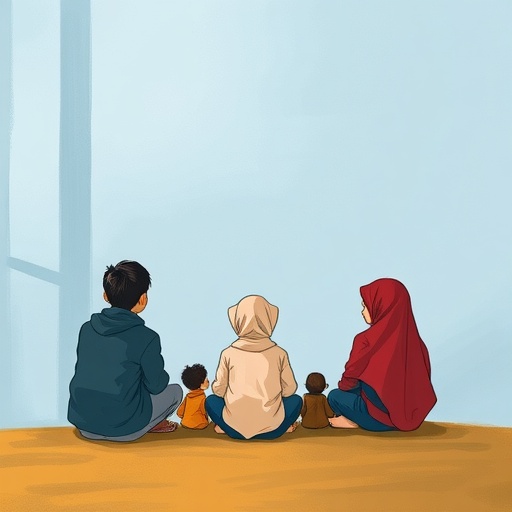In a groundbreaking study set to be published in 2025, researchers Cowling, Whelan, and Anderson investigate the intricate dynamics influencing the mental health and well-being of refugee and asylum-seeking children in Malaysian schools. The challenges faced by such vulnerable populations are immense, and the findings of this research promise to shed much-needed light on the factors that can either mitigate or exacerbate their mental health struggles within an educational context.
The mental health of refugee children has become increasingly pressing as global events continue to displace millions. These children often grapple with the traumatic repercussions of conflict, loss, and displacement. When they arrive in a new country, they face the daunting task of not only adapting to a new culture but also navigating the intricacies of a foreign education system. Malaysia, as a prominent host country in Southeast Asia, provides a unique setting to study these phenomena. The interplay between school environments and mental health needs among these children deserves thorough examination.
The research focuses on school-based predictors of mental health and well-being. Cowling and her colleagues selected a diverse sample of refugee and asylum-seeking children from multiple backgrounds to participate in their study. By closely analyzing the school environments these children inhabit, they aim to understand how various factors—such as teacher support, peer relationships, and school resources—impact their mental and emotional well-being. The findings could potentially inform educational policy and practices, ensuring that schools become safe spaces conducive to healing and growth.
The study employs a mixed-methods approach, combining quantitative data from standard mental health assessments with qualitative insights obtained from interviews. This methodology allows for a comprehensive understanding of the mental health landscape as experienced by these children. Statistical analyses will provide concrete evidence of trends and relationships, while personal narratives will illuminate the nuanced individual experiences that numbers alone cannot convey.
Initial findings indicate that school connectedness plays a pivotal role in fostering resilience among refugee children. When students feel a sense of belonging within their educational institutions, they are more likely to achieve better academic and mental health outcomes. Schools that promote inclusivity and provide support systems such as counseling services can significantly mitigate the adverse effects of trauma. The researchers advocate for training educators to recognize the signs of distress and employ trauma-informed practices that cater specifically to the needs of these children.
Another compelling aspect of the study is the examination of peer relationships. The bonds formed between students serve not only as the foundation for social integration but also as crucial protective factors against mental health issues. When refugee children can forge meaningful connections with their peers, they often experience increased feelings of hope and belonging, which foster resilience. By identifying and promoting initiatives that encourage positive interactions among students, schools can cultivate an environment where emotional well-being thrives.
Moreover, the availability of school resources undeniably influences mental health outcomes. Access to trained counselors, mental health workshops, and recreational activities can help refugee children cope with their past traumas and adapt to their new circumstances. In contrast, schools that lack appropriate resources may inadvertently exacerbate the mental health challenges these children face, resulting in broader implications for their academic success and emotional stability.
The researchers also note the importance of cultural competence within schools. Being mindful of the diverse backgrounds of refugee students is critical to creating an inclusive atmosphere. Educators must receive training that emphasizes cultural sensitivity and awareness to better understand the unique experiences of their students. By fostering a culturally responsive educational environment, schools can optimize their approaches to support the mental health of all students, especially those from marginalized backgrounds.
As the study progresses, the team aims to formulate recommendations for policy-makers, educators, and mental health practitioners. The ultimate goal is to create an actionable framework that schools can implement to support refugee children effectively. Tailoring interventions to meet the specific needs of these students based on the research’s findings could lead to significant improvements in their mental health trajectories and overall school experiences.
Research of this nature has vital implications beyond Malaysia. As global migration patterns shift and the number of displaced children grows, the insights gained from this study may serve as a model for other countries hosting refugee populations. Other educational systems can learn valuable lessons from the challenges and successes observed within Malaysian schools to implement best practices.
In summary, the study by Cowling and her colleagues is set to contribute substantially to our understanding of the intertwined relationship between educational environments and mental health for refugee children. By focusing on school-based predictors of well-being, this innovative research has the potential to inform policies and practices that prioritize the mental health needs of some of the world’s most vulnerable children.
The conversation surrounding refugee mental health is crucial, especially in educational settings where these children seek not only knowledge but also a sense of stability in the midst of chaos. It is imperative for schools to embrace their role as fundamental pillars of support that can help mitigate the effects of early trauma and pave the way for a brighter, healthier future for these young individuals.
As the publication date approaches in 2025, anticipation builds around the comprehensive findings and recommendations that will emerge from this significant research endeavor. The evidence gathered will not only add depth to existing scholarly discourse but also serve as a catalyst for positive changes within educational systems, ultimately enhancing the lives of refugee and asylum-seeking children across the globe.
Subject of Research: School-Based Predictors of Mental Health and Well-Being for Refugee and Asylum-Seeking Children
Article Title: School-Based Predictors of Mental Health and Well-Being for Refugee and Asylum-Seeking Children: Evidence from Malaysia
Article References:
Cowling, M.M., Whelan, T.A. & Anderson, J.R. School-Based Predictors of Mental Health and Well-Being for Refugee and Asylum-Seeking Children: Evidence from Malaysia.
School Mental Health (2025). https://doi.org/10.1007/s12310-025-09780-z
Image Credits: AI Generated
DOI:
Keywords: Refugee children, mental health, school-based predictors, Malaysia, trauma-informed practices.




